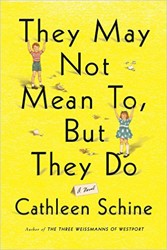The Wartime Sisters is a classic tale of sibling rivalry in a Jewish family, but with some surprising modern twists. Ruth, the plain, bookish older sister and Millie, her beautiful, flighty younger sibling, are fighting not just for male attention, but also for validity and self-worth. Their mother favors Millie for her beauty, feeding Ruth’s resentment, while Millie is only happy when she is babysitting for an Italian immigrant family that respects and loves her for her American know-how and fun-loving ways rather than her looks. The girls grow up in Brooklyn during the Great Depression and reach adulthood during World War II. Lynda Cohen Loigman does a masterful job of narrating through the use of flashbacks, not just in time but also in viewpoint. Instead of a linear progression, the story is told like a tapestry, weaving back and forth the shared and separate events as the two sisters remember them, as well as events in the life of the friend they share — Lillian, the privileged, patrician gentile woman who still grieves for her abused mother. All these private stories are set against the backdrop of the Springfield Armory in Massachusetts.
The Armory is a real historic site and the author describes its history in a note at the end of the book. At the time of the revolution, it was an arsenal, and later, George Washington established an arms factory there which provided weapons for both world wars. However, Loigman’s focus is on World War II when at one point, 43 percent of the workers at the Armory were women. It’s a bittersweet pleasure to read a tale about that period in American history when the country was united behind the war effort and differences between people were minimized for the common good. Defense workers were referred to as “soldiers of production” and were able to feel that their work was vital to victory and that they were all on the same team. Loigman paints a picture of the camaraderie among the workers despite their different backgrounds, and the way that Lillian, the commanding officer’s wife, bridges the divide between the upper-class officers and civilian workers.
The Wartime Sisters is a quick and engrossing read, with a well-crafted plot and adept pacing. It’s a fresh take on historical fiction.
Beth Dwoskin is a retired librarian with expertise in Yiddish literature and Jewish folk music.



